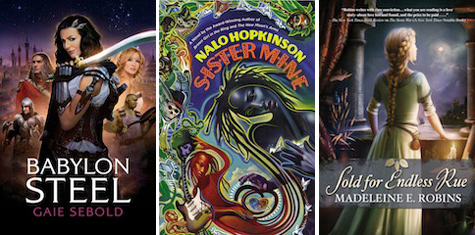I have of late been ill. And when I’m ill—but not quite so ill as to crawl into a corner and wait for death—I read things. Lovely, distracting, fictional things.
(Well, that and complain about snot all over Twitter. But that’s not nearly as interesting.)
Much more interesting is a book that only recently caught up with me, after lingering in a friend’s home since spring. Gaie Sebold’s Babylon Steel (Solaris, 2011) is a remarkably entertaining debut. It’s as though someone took the best bits of Robert E. Howard and the fantasy noir city of Simon R. Green’s Hawk and Fisher novels, threw in some more Cool Shit ™, and reimagined them through a lens that foregrounded female perspectives. This is sword-and-sorcery pulp wish fulfilment for the kind of girl who wanted to be Conan.*
*Who, me? I’m sure I don’t know what you’re talking about…
And that? That makes one of the most awesome things I’ve read this year.
Although I’m really glad I didn’t see the kind of PR material for it that Martin Lewis did. Lewis’ review says too little about the cool and entertaining shit and too much about the sex. Jared at Pornokitsch (and Lizzie Barrett there, too) highlights to a greater degree Babylon Steel’s appeal. That appeal is the titular character herself—dryly self-deprecating, badass but not invulnerable, not great with numbers, in control of her own sexuality—and the way in which the narrative positions her at the centre of a network of friends and relationships, all of which matter.
The story unfolds on two levels. In the present, in the vibrantly grimy metropolis of Scalentine, Babylon—an (my mental image defaults to “scruffy”) ex-soldier who runs an upmarket brothel with constant cashflow difficulties—is drawn into investigating the disappearance of a young woman, among all the other troubles that beset her—including the possible appearance of demigods from the land of her youth. The second layer unfolds in the past: we learn of our protagonist’s youth in a decaying land edged by deserts… and just how, exactly, she came to her intense dislike and distrust of religion.
Past and present eventually come together in a pretty excellent climax. Sebold evokes mood and atmosphere—and character—very well. And the climactic BOOM LIKE THAT is an earned one.
An excellently entertaining book. Give me more like this. MORE I TELL YOU.
Martha Wells’ Star Wars: Razor’s Edge is a Star Wars novel from the pen of one of fantasy’s most undeservedly underrated voices. I like many Star Wars novels: there’s a air to them (Expanded Universe aside) of adventuring with old friends. This particular Star Wars novel is a flawed diamond, but fun nonetheless: between the events of A New Hope and The Empire Strikes Back, Leia and Han meet pirates and fight crime.
Canadians! You have some excellent people writing fantasies set in cities, like Tanya Huff and recent debut novelist Leah Bobet. Nalo Hopkinson’s Sister Mine is an especially excellent fantasy-in-Toronto, with gods and demi-gods and sisters all working out a particularly fraught set of family interactions. It is about family, complicated family, and it is amazing, and everyone should read it.
Madeleine E. Robins’ Sold For Endless Rue is an unusual book, and I have conflicting feelings about it. It’s a historical novel, but one shaped around the spine of a fairytale and with some of the emotional beats of a fantasy. I’m not entirely sure it is well-served by the fairytale, but there is much in it that is purest excellence—and I’m a sucker for anything involving medieval female physicians. Trotula for the win!
Every so often along comes a novel of which I must ask: “And where were you when I was fourteen?” Helen Lowe’s (David Gemmell Morningstar Award-winning) The Heir of Night is just such a novel, with a pair of thirteen-year-old protagonists, evil monsters, world-shattering evil, grand destinies, and FATE OF WORLDS hanging in the balance. It fits in the same corner of the fantasy genre as Kristen Britain’s Green Rider books, and bears some small (albeit less imaginative and much purpler) resemblance to PC Hodgell’s Chronicles of the Kencyrath series. The opening of a longer arc (Trilogy? Series? Sometimes nobody tells me anything), it resolves nothing and has some notable pacing problems, but its portentous sweep nonetheless possesses significant appeal.
Now it’s over to you, Dear Readers. What is good? What is bad? What should we talk about?
Liz Bourke is a cranky person who reads books. Her blog. Her Twitter.










